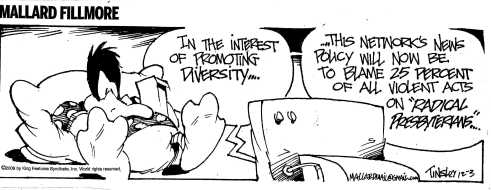
Happy Presbyterian Rebellion Day!
....The answer to the overarching question, then, is a nuanced affirmative. Did King George III call the American Revolution a Presbyterian Rebellion? Maybe, or even probably, but primary source documentation is lacking. Did King George III consider the American Revolution a Presbyterian Rebellion? Definitely. …[H]e gave every impression that it was a sentiment he held. Nothing suggests that George III disagreed with the opinion of his advisor, William Jones, who said that the American Revolution was a Presbyterian war from the beginning....
...Anyone attempting to allege a Presbyterian vs. Episcopalian controversy at the bottom of the revolt must explain the contradictory evidence. In particular, some of the most important leaders of the revolution were, in fact, Episcopalians — members of the Church of England. Of the 56 signers of the Declaration of Independence 34 were Episcopalians while only 6 were Presbyterians. In that light, it seems that the king would have had more warrant to call the revolution an “Episcopal Rebellion” than a “Presbyterian Rebellion.” All one has to do is cite the examples of Thomas Jefferson, George Washington, James Madison, Patrick Henry, and George Wythe; and the Anglican vs. Presbyterian interpretation of the war quickly breaks down. These men were all bona fide Episcopalians, but at the same time, promoters of American independence.
The loyalists were quite aware of these facts, but they did not concede the point. According to loyalists, although many of the rebels wore Anglican masks, their hearts were not in harmony with their facade. Such was the observation of a loyalist named Tingly who tried to explain in 1782 the contradictory behavior of these revolutionary Episcopalians. Tho they always professed themselves Churchmen [i.e., Episcopalians], they have proved that their principles & professions were not unisons; or, in other words, that they are Churchmen by profession, but Presbyterians by trade, i.e., no friends to [Anglican] Church and state … And those of this stamp joined with the hot brained Zealots among the Presbyterians who have almost all, without exception, proved fiery advocates for independency....
....So, a happy Independence Day to my American friends as we remember this Presbyterian Rebellion.

Happy Presbyterian Rebellion Day!
Well, although a number of Episcopalians joined the rebellion, it tended to be people who had a problem with the Established Church of England.
In the mid seventeenth century, it was the Presbyterians who led the way in the Civil War and Puritan Revolution. But in the late seventeenth and early eighteenth century, some of the chief opponents of the Hanoverian rule were Scottish and English Catholics, who fought several times to try to restore the House of Stuart to the throne. See several of Walter Scott’s novels for some good accounts.
And in the American Revolution, Catholics played an important role—notably the Maryland Catholics such as Charles Carroll of Carrollton—who put up a ton of money to support the rebellion and was one of the signers of the Declaration of Independence.
So, perhaps oddly from the perspective of many of the Catholic-baiters on this thread, it was a coalition of Puritans and Catholics, among others, who defeated the British.
I’m reading CROMWELL Our Chief of Men by Antonia Fraser.
It’s a very difficult read because of the scope of time, events, and various parties and views involved.
I find it particularly interesting because A. Fraser is a Catholic historian discussing Cromwell, the Presbyterians/Covenanters as a political movement, working to remove the monarchy and institute representative government.
Reading this article, I see that it is important to know that Presbyterianism and government goes way back to the 1600’s and is integral to English history...it certainly didn’t start with America.
I am not a scholar, and state that this is clumsily written.
Great article to be reading at this time.
Just adding my two-bits.
In North Carolina, the Presbyterians joined with the royal Governour (Tryon) to persecute Baptists, Quakers, and other groups, and to try to force them to pay taxes to the king to support the religious establishment.
I know the quote you’re looking for, I’ve run across it when reading about ‘Huck’s Defeat’, a small Patriot victory in which my ancestor John Carroll shot Captain Christian Huck, the leader of the Loyalists terrorizing the South Carolina back country. This is the actual quote:
“Call this war by whatever name you may, only call it not an American Rebellion: it is nothing more or less than a Scotch-Irish Presbyterian Rebellion.”
It was made in 1778 by a Hessian officer in the service of King George III and is cited from this source:
Ronnie Hanna, Land of the Free (Lurgan, Co. Armagh, N. Ireland: Ulster Society Publications Limited, 1992)
You can read about Huck’s Defeat, the Battle of Williamson’s Plantation here:
http://sciway3.net/clark/revolutionarywar/1780-Huck_noframes.html
http://en.wikipedia.org/wiki/Huck’s_Defeat

Episcopalianinos? Happy 4th indeed.
for reading later
Further evidence to the madness of King George.